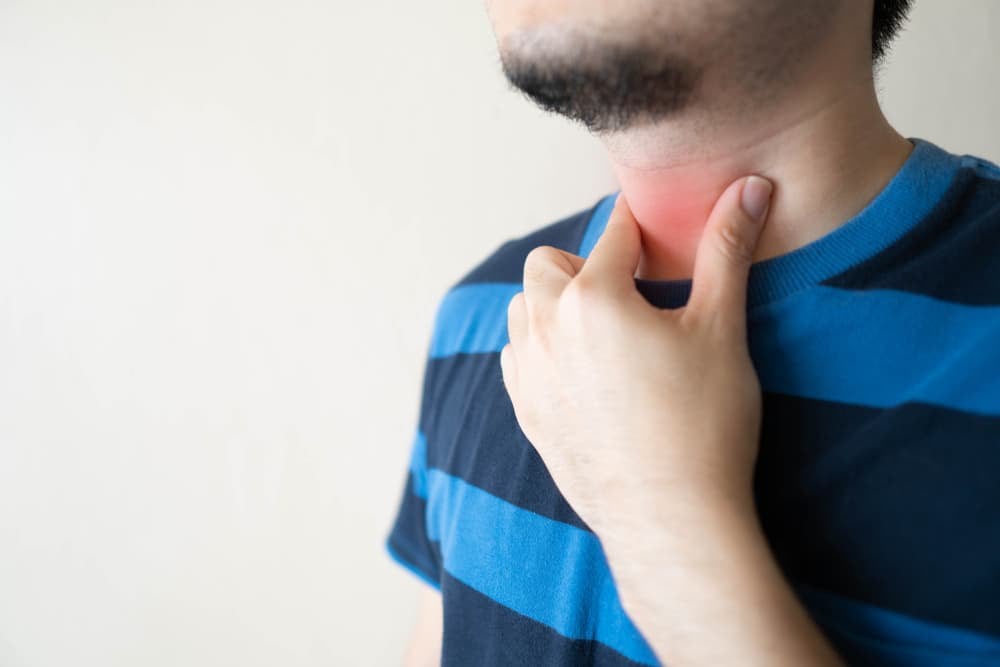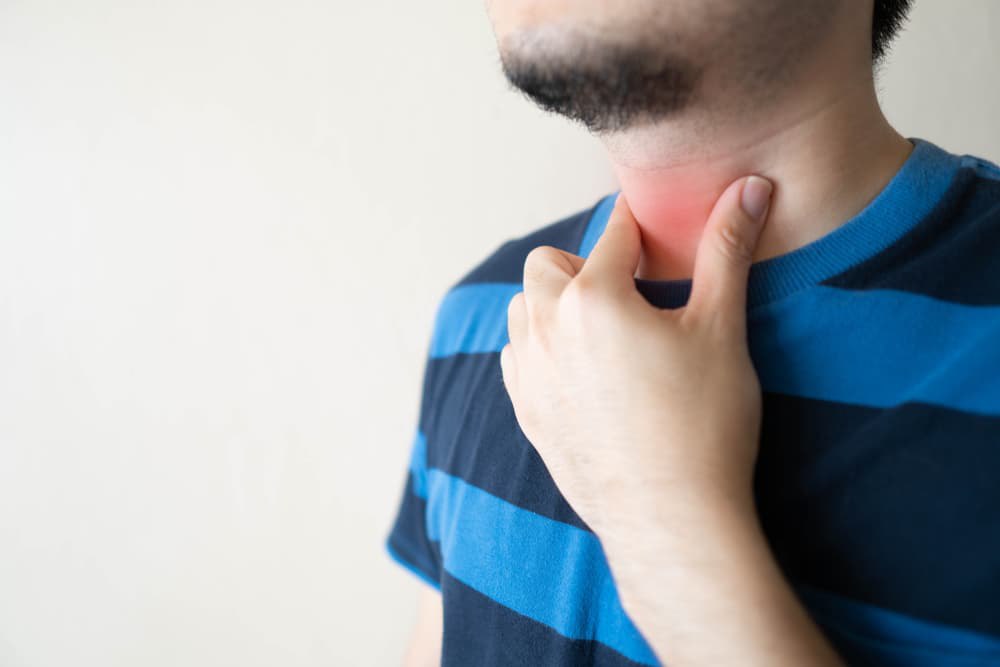What is a Hoarse Voice (Hoarseness)? Signs, Causes and Treatments
September 3rd, 2019 | 4 min. read


Hoarseness is a presentation doctors see in primary care and ear, nose and throat practices, and is the reason for around one percent of all primary care consultations.
It's important to know hoarseness isn't a disease in itself, but rather a symptom.
What is a Hoarse Voice (Hoarseness)?
Hoarseness, or dysphonia, is where you have an abnormal change in your voice quality, which makes it sound:
-
Strained
-
Raspy
-
Breathy
-
Lower or higher in pitch
-
Weak
-
Fatigued
-
Inconsistent
It often makes it difficult for you to talk. This typically occurs when you have a problem in the vocal cords of your larynx (voice box) which produces sound. When you breathe your vocal cords (folds) are separated, however, when you make a noise, they come together and they vibrate when the air is leaving your lungs. Hoarseness results when anything alters the closure or vibration of your vocal cords.
What is a Raspy Voice?
When your voice is hoarse, it may sound raspy. A sound is raspy when it's scratchy or rough. If you scream for several hours (i.e. encouragement to a losing team or celebration to a winning team) or have a bad cold, you could wind up with a raspy voice.
A raspy voice tends to sound like it had to pass through a grater or a rasp (a scraping tool) to get out of your mouth. If you can hardly speak, you may talk in a raspy whisper.
Signs of a Hoarse Voice (Hoarseness)
If you experience any of these signs of hoarseness, you will want to make an appointment with an otolaryngologist or an ENT (ear, nose, and throat) doctor as soon as possible:
- Serious changes in your voice lasting more than several days.
- Hoarseness that lasts over four weeks, particularly if you smoke.
- Pain when you speak.
- Difficulty breathing.
- Vocal professionals (public speaker, singer) who can't do their job.
- Voice changes like strained, raspy, lower or higher in pitch, weak, breathy, fatigued, inconsistent or shaky voice.
Hoarse Voice Causes
Hoarseness is typically caused by injury or irritation of the vocal cords. A number of conditions can also cause hoarseness.
A common cause is acute laryngitis (vocal cord inflammation) usually caused by a viral upper respiratory tract infection. Less often it's caused by misuse or overuse of the voice (i.e. singing, yelling).
Other causes are:
- Benign vocal cord lesions: Polyps, nodules and cysts often develop after extended vocal cord trauma from talking too loudly or too much.
- Neurological disorders or diseases: It can occur after a stroke or with Parkinson's disease. Spasmodic dysphonia, a rare disorder, can also create uneasy breathing and hoarseness. A paralyzed vocal cord, often following surgery, injury or viral illness can also cause a breathy, weak voice.
- Precancerous or cancerous lesions: Either of these on your vocal cords could lead to hoarseness. If the hoarseness lasts for over four weeks, you're at a greater risk of throat cancer, particularly if you smoke, and you should have an ENT specialist evaluate your voice box.
- Vocal cord hemorrhage: You could lose your voice after a strenuous vocal activity, like yelling, if a blood blister/blood vessel breaks and fills your vocal cord with blood. If this happens, it's a vocal emergency and you should see an ENT doctor who will likely prescribe you complete voice rest.
- Vocal cord atrophy: As you age, your vocal cords start becoming thinner (reduced bulk) and floppy (reduced tone). This isn't due to too little or too much talking, it's just how it is. A raspy voice changing here and there with reduced power is common.
- Smoking: Smoking raises your risk of developing throat cancer. It could also lead to permanent vocal cord changes, possibly leading to swelling which lowers your voice pitch and in severe cases, could block your airway. If you smoke and develop hoarseness, see an ENT doctor right away.
- Reflux: Reflux is when non-acidic or acidic stomach contents move up into your esophagus (swallowing tube) from your stomach. Classic indigestion and heartburn are symptoms of a condition called gastroesophageal reflux (GERD), caused by acid. If you have stomach acid that moves up to your esophagus and flows into your voice box or throat, it's called laryngopharyngeal reflux (LPR).
Hoarse Voice Treatment Options
Below are treatment options for a hoarse voice. Some you may try at home, but others, including chronic cases of hoarseness require treatment from your Houston Ear, Nose and Throat doctor.
- Rest your voice for several days. Avoid shouting and talking. Don't whisper since this could strain your vocal cords more.
- Drink a lot of water or other hydrating fluids. Fluids moisten your throat and could ease some of your symptoms.
- Avoid alcohol and caffeine. These can dry your throat out and make the hoarseness worse.
- Add moisture to the air with a humidifier. It could help open up your airway and make it easier to breathe.
- Take a hot shower. The shower's steam can help provide moisture and open your airways.
- Chew gum or suck on lozenges to moisten your throat. This helps to stimulate salivation and could help soothe your throat.
- Limit or stop your smoking. Smoke irritates and dries your throat.
- Get rid of allergens from your atmosphere. Allergies can often trigger or worsen hoarseness.
- Don't use decongestants to treat your hoarseness. They can dry out and irritate your throat.
- Consider medications if it turns out you have GERD. Certain medications could help.
- Discuss surgical options with your doctor. Surgery may be required for benign polyps or nodules, cancer of the larynx or trauma to the vocal cords/larynx.
Seek Treatment for Hoarseness at Our New Voice and Swallowing Center at Houston Ear, Nose, Throat & Allergy Clinic
Houston Ear, Nose, Throat, & Allergy Clinic is pleased to announce the opening of our new Voice and Swallowing Center at our Southwest Houston ENT office and Memorial City ENT office. Dr. Michael Underbrink, M.D., M.B.A., F.A.C.S. leads the center. The Voice and Swallowing Center offers diagnostic and treatment services for laryngitis, hoarseness and many other voice, swallowing, and airway disorders.
If your voice has been hoarse for over three weeks, see your Houston ENT doctor for treatment options of a hoarse voice, particularly if you haven't had the flu or a cold. If you have trouble swallowing or are coughing up blood, see your doctor. Also, if you experience pain when you speak or swallow, feel a lump in your neck, lose your voice completely or have difficulty breathing for more than a few days, see your doctor.
Chronic and persistent hoarseness could indicate a serious underlying health condition. Your doctor could diagnosis this underlying cause based on a physical exam and your history. They will ask you questions about your hoarse voice and other symptoms you’re experiencing. The physical exam focuses on your neck and head. In some cases, they may use a long, flexible, lighted tube (fiberoptic scope) and insert it into your throat to see your vocal cords.
Early intervention could improve your outcome. Finding and treating the cause of your chronic hoarseness could prevent the worsening of the condition and limit any damage to your throat or vocal cords.
Call 281-649-7000 to schedule an appointment at the Voice and Swallowing Center of Houston Ear, Nose, Throat & Allergy Clinic.
Topics:

